一般过去式的用法
一般过去时地用法及结构

一般过去时的用法及结构1.一般过去时的基本用法一般过去时表示过去某个时间发生的动作或存在的状态,也可表示过去经常或反复发生的动作。
常和表示过去的时间状语连用,如yesterday, last week, last night, in 2003, two days ago等。
【举例】 I got up at 6:30 yesterday. 我昨天6:30起床。
My father was very busy last week. 我父亲上周很忙。
2.一般过去时的基本结构⑴肯定句“主语+动词过去式+其他”或者“主语+was/were+其他”。
【举例】 I played tennis last weekend. 我上周末打网球了。
My school trip was great. 我的学校郊游棒极了。
⑵否定句“主语+didn’t+动词原形+其他”或“主语+wasn’t/weren’t+其他”。
【举例】 The girl didn’t play computer games yesterday afternoon.这个女孩昨天下午没玩电子游戏。
Old Henry wasn’t happy last Friday. 上星期五老亨利不高兴。
⑶一般疑问句“Did+主语+动词原形+其他?”肯定回答为“Yes,主语+did”,否定回答为“No,主语+didn’t”或者“Was/Were+主语+其他?”肯定回答为“Yes,主语+was/were”,否定回答为“No,主语+wasn’t/weren’t”。
【举例】— Did you go to the beach? 你们去海滩了吗?— Yes, we did./No, we didn’t. 是的,我们去了。
/不,我们没有。
— Was your weekend OK? 你的周末过得还行吧?— Yes, it was./No, it wasn’t. 是的,还行。
/不,不行。
一般过去时的用法与定义详细

一般过去时的用法与定义详细一般过去时是英语学习者学习以及英语从教者教授的一大难点,其用法你了解多少呢?以下是由店铺整理关于一般过去时的用法的内容,希望大家喜欢!一般过去时的用法一、概述1.表示在的过去某个时间里所发生的动作或存在的状态。
时间状语有:yesterday, last week, an hour ago, in 1982等。
如:1)I was at the zoo yesterday. 昨天我在动物园。
2)I went to bed at eleven last nigth. 昨晚我11:00睡觉。
2.表示在过去一段时间内,经常性或习惯性的动作。
1)When I was a child, I often played football in the street. 我在小的时候,我经常在街道上踢足球。
2)My father often drove to work last year. 去年,我爸爸经常开车上班。
二、句子结构1.在表示某个时间里存在的状态的句子,系动词用过式was,were构成。
如:(1)I was at home yesterday. 昨天我在家。
(2)We were in the gym just now. 刚才我们在体育馆。
2.在表示过去某个时间里发生的动作,用动词的过去式构成。
如:I visited my uncle yesterday. 昨天我拜访了我的叔叔。
3.各种句式(1)一般过去时的肯定陈述句:主语 + 动词过去式 + 宾语或表语。
He worked in Shanghai ten years ago.(2)一般过去时的否定句:a.主语+ didn’t + 动词原形 + 宾语。
(did + not = didn't)He didn't do morning exercises yesterday. b.主语+ wasn’t/weren’t +表语。
一般过去式时的结构和用法

一般过去式时的结构和用法一般过去式是用来表示过去发生的动作或状态的时态。
在英语中,一般过去式的结构通常由动词的过去式形式构成,具体用法如下:1. 肯定句结构:主语 + 动词过去式 + 其他成分例如:- I played tennis yesterday.(我昨天打网球。
)- She cooked dinner last night.(她昨晚做了晚饭。
)2. 否定句结构:主语 + did not + 动词原形 + 其他成分例如:- I did not watch TV last night.(昨晚我没有看电视。
)- They did not go to the park yesterday.(昨天他们没有去公园。
)3. 疑问句结构:Did + 主语 + 动词原形 + 其他成分?例如:- Did you finish your homework?(你完成作业了吗?)- Did she go shopping yesterday?(她昨天去购物了吗?)需要注意的是,在一般过去式中,动词的过去式形式分为规则变化和不规则变化两种。
规则变化是在动词原形后加上-ed或-d,而不规则变化则需要特殊记忆。
例如,动词play的过去式是played,而动词go的过去式则是went。
此外,一般过去式还常与表示过去的时间状语连用,以指明动作或状态发生的具体时间点。
常见的时间状语有yesterday(昨天)、last night(昨晚)、last week(上周)、in 2010(在2010年)等等。
总之,一般过去式主要用于表示过去发生的动作或状态,通过动词的过去式形式和相应的句子结构来构成。
常见一般过去时用法总结

一般过去时知识点总结用法①:含有was/were常表示过去存在的状态am/is过去时was are过去式were例句:(1)I was happy last week.,(2)There was a bottle on the desk just now.时间状语:①yesterday(昨天)/yesterday morning/evening/afternoon (昨天上午、下午、晚上)/the day before yesterday 前天②ago(……之前)/a moment ago(不久前)/two minutes ago (两分钟之前)/a year ago (一年前)/half a month ago(半个月之前)③last(上一个)/last night/Monday/week/month/spring/year(昨天晚上、上周一、上周、上个月、去年春天、去年)④just now (刚刚)⑤一个过去的时间:如in 2008 (在2008年)/on 3rd October (在10月3日)句型转换(1)I was happy last week.①②变否定:I was not (wasn’t) happy last week.方法:一找be(was/were),二在be(was/were)后加not,三若有some 变any,若有and变成or。
变一般疑问句:Were you happy last week?方法:一找be(was/were),二在把be(was/were)提前,三若有some 变any,若有and变成or,四主语第一变第二。
肯定回答:Yes, I was. 否定回答:No, I wasn’t.对划线①提问:How were you last week?对划线②提问:When were you happy?方法:一判断:判断划线部分是什么内容,二选择:选择合适的特殊疑问词替换划线部分,三特殊疑问词放句首,四后面接一般疑问句。
一般过去时用法描述

一般过去时用法描述一般过去时是英语语法中的一种时态,用于描述发生在过去的动作、事件或状态。
在构成上,一般过去时的动词形式为动词的过去式,通常是动词原形加上-ed结尾,或者根据动词的变化规则来变化。
一般过去时除了描述过去的动作之外,还可以用于表达过去的习惯、习惯性行为或者过去的真实情况。
在进行详细描述时,可以从一般过去时的构成、用法及常见错误等方面进行阐述。
接下来,我们将着重介绍一般过去时的用法,以及一些注意事项。
一、一般过去时的用法:1. 表示过去的动作或事件:一般过去时常用来描述过去发生的动作或事件,例如:- She visited her grandparents last summer.(她去年夏天拜访了她的祖父母。
)- They went to the park yesterday.(他们昨天去了公园。
)2. 表示过去的习惯或习惯性行为:一般过去时也可以用来描述过去的习惯或经常发生的行为,例如:- When I was a child, I played with my friends every day.(我小的时候,每天都和朋友们一起玩。
)- He always helped his mother with the housework.(他总是帮他妈妈做家务。
)3. 表示过去的真实情况:一般过去时还可以用来表示过去的真实情况,例如:- I thought he was a nice person.(我当时以为他是一个好人。
)- The sky was clear and the sun was shining.(天空晴朗,阳光灿烂。
)二、一般过去时的构成:一般过去时的构成主要取决于动词的不规则变化规则和规则变化规则。
不规则动词的过去式形式需要单独记忆,而规则动词的过去式则通常是在动词后面加上了-ed结尾。
以下是一般过去时的构成规则的主要内容:1. 一般动词(regular verbs):- 动词原形+ed结尾,例如:walked, talked, played等。
一般过去时态的动词用法
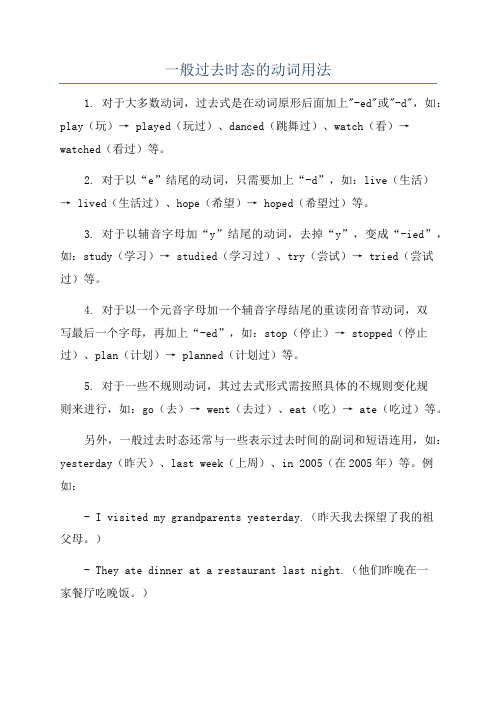
一般过去时态的动词用法
1. 对于大多数动词,过去式是在动词原形后面加上"-ed"或"-d",如:play(玩)→ played(玩过)、danced(跳舞过)、watch(看)→ watched(看过)等。
2. 对于以“e”结尾的动词,只需要加上“-d”,如:live(生活)
→ lived(生活过)、hope(希望)→ hoped(希望过)等。
3. 对于以辅音字母加“y”结尾的动词,去掉“y”,变成“-ied”,如:study(学习)→ studied(学习过)、try(尝试)→ tried(尝试过)等。
4. 对于以一个元音字母加一个辅音字母结尾的重读闭音节动词,双
写最后一个字母,再加上“-ed”,如:stop(停止)→ stopped(停止过)、plan(计划)→ planned(计划过)等。
5. 对于一些不规则动词,其过去式形式需按照具体的不规则变化规
则来进行,如:go(去)→ went(去过)、eat(吃)→ ate(吃过)等。
另外,一般过去时态还常与一些表示过去时间的副词和短语连用,如:yesterday(昨天)、last week(上周)、in 2005(在2005年)等。
例如:
- I visited my grandparents yesterday.(昨天我去探望了我的祖
父母。
)
- They ate dinner at a restaurant last night.(他们昨晚在一
家餐厅吃晚饭。
)
- She lived in Paris for a year in 2024.(她在2024年在巴黎生活了一年。
一般过去式结构和用法

一般过去式结构和用法
一般过去式是用来表示在过去发生的动作或状态的时态。
一般过去式的结构是由动词的过去式形式构成,通常在动词原形后面加上了-ed或-d。
不过,还有一些特殊的情况需要注意,比如一些动词的过去式形式是不规则变化的,需要单独记忆。
一般过去式主要有以下几种用法:
1. 表示过去某个时间点发生的动作或状态:
- I watched a movie last night.(我昨晚看了一部电影。
)
- He lived in London for five years.(他在伦敦住了五年。
)
2. 表示过去一段时间内反复发生的动作或状态:
- They visited their grandparents every summer.(他们每个夏天都去看望他们的祖父母。
)
- We played soccer every weekend when we were kids.(我们小时候每个周末都踢足球。
)
3. 用于条件句中表示假设或虚拟的情况:
- If I had more money, I would travel around the world.(如果我有更多的钱,我会环游世界。
)
4. 用于间接引语中表示间接引述的内容:
- She told me that she passed the exam.(她告诉我她通过了考试。
)
需要注意的是,有些动词在一般过去式中形式上没有变化,比如cost、cut、put等。
同时,还有一些动词的过去式形式与原形一样,需要根据上下文来确定时态,比如read、hit、set等。
一般过去式的用法

一般过去式的用法:一般过去式表示过去的动作和状态,通常一般过去式带有表示动作时间状语的词,词组或从句,如yesterday, the day before last, last week, two days ago 等,上下文清楚时可以不带时间状语;I worked in that factory last year. 去年我在那一家工厂工作;I met him yesterday. 昨天我碰见了他;I went to the Tian Long Mountain yesterday.昨天我们去了天龙山;一般过去式构成:表示一般过去式的动词通常用动词的过去式形式来表示,而动词的过去式是在动词原形的基础上变化的;动词的过去式可分为规则动词和不规则动词;a.规则动词的过去式变化如下:①一般情况下在动词原形后直接加-ed;如:wanted,played, workedplayed ,acted, looked called opened needed;②以不发音的字母e结尾的动词,去掉e再加-ed;如:hoped,lived;③以一个辅音字母结尾的重读闭音节动词,双写词尾辅音字母,再加-ed,如:stopped planned fitted④以辅音字母+y结尾的动词变y为i,再加-ed;如:studied,worried,tried ,copied ,cried, carried;以原音字母加y结尾的词,直接加-ed play enjoy stay played enjoyed stayed规则动词过去式的读音也有规律可循;请记住:清后t,元浊d,t d之后读id;①清辅音p k f s等后,ed要读t;如:worked,finished;②元音或浊辅音b g v z m等后,ed要读d;如:lived,called;③t或d后,ed读id;如:started,needed;b.不规则动词变化不规则动词的过去式变化规律性不强,须多加记忆;1.动词原形和过去式完全同形;例:hurt伤害put放let让2.动词原形、过去式形式完全不同;例:give给gave fly飞flew drink喝drank see看见saw go去went make - made get - got buy - bought come came know知道knew wear穿wore speak说spokebe动词过去式有两种形式,主语是第一、三人称单数形式使用was,其他人称用were6 现在分词的变化规则一般在动词原形词尾加-ing,go push play carry going pushing playing carrying 以不发音的e结尾的动词,先去掉e,再加-ing take write leave taking writing leaving重读闭音节结尾的动词,如果词尾只有一个辅音字母,要将该辅音字母双写,再加-ing cut stop fit begin forget cutting stopping fitting beginning forgetting 以ie结尾的动词,要把ie改为y,再加-ing牛津英语6A英语语法二一般过去时定义:表示过去某时发生的动作或存在的状态;结构:“主语+动词的过去式”用法:1.表示过去某个时间发生的动作或存在的状态;He was here yesterday.I got up at seven yesterday morning.My mother was at work yesterday afternoon.Did you have a good time last summer2.表示过去经常或反复发生的动作;My mother often went to work by taxi last year.When I was a student, I often listened to music.3. 常与一般过去时态连用的时间有:at that time, then, at that moment, yesterday, yesterday morning afternoon, evening…last night week, month, year…,一段时间+agoseveral days ago, two days ago, a week ago, three years ago…in 1990, in 1997…,just now, long before, long, long ago二. 动词过去式构成规则一1、一般在动词原形末尾加–edhelp →helped, look →looked, play →played, work →worked, listen →listened, wash →washed, clean →cleaned,2、结尾是e 的动词加-- dlive---lived hope---hoped use---used like --- liked3、末尾只有一个辅音字母的重读闭音节词,先双写这个辅音字母,再加—edstop---stopped plan---planned4、结尾是“辅音字母+y”的动词,先变“y”为“i”再加—edstudy---studied carry ---carried cry --- cried worry →worried 二动词过去式的读音规则规则动词加-ed的读音:基本规则是轻轻,浊浊,既在轻辅音后加ed读轻辅音/t/;在浊辅音及元音后加ed读浊辅音/d/ ;例:ask →asked /a:skt/, cook →cooked /kukt/, pass →passed /pa:st/,例:move →moved /mu:vd/, live →lived / livd/, listen →listened/`lisnd/, stay →stayed /steid/在/t/ /d/ 之后念/id/ , 即ed 在/t/ /d/ 音后面念/id/例:shout →shouted 去式与动词原形的拼写形式相同:let →let, put →put, read →read,注意read的过去式读redb. i →a: begin →began, drink →drank, give →gave, ring →rang, sing →sang, sit →sat, swim →swamc. i →o: drive →drove, ride →rode, write →wroted. ow →ew: grow →grew, know →knew, throw →threwe. 含ough或augh的:bring →brought, buy →bought, think →thought;catch →caught, teach →taughtf. am is ---was are ---were do---did can---could come---came不规则动词的过去式平时出现要留心,逐个熟记,注意积累;三. 句型转化:1.be 动词的过去时的句型如下:1否定句:主语+ be动词的过去式was, were+ not…2疑问句:be动词的过去式was, were+ 主语…was busy yesterday. 肯定句他昨天很忙;was not busy yesterday. 否定句他昨天不忙;he busy yesterday 疑问句他昨天忙吗weren’t any boys in the room.房间里没有男孩儿;e. Were there any boys in the room 房间里有男孩儿吗2.行为动词的否定式和疑问式:1若肯定句中只有一个行为动词,那就得在行为动词前加上did not或缩略式didn’t,并把这个行为动词由过去式改为动词原形;例如:a. I called Lin Tao yesterday afternoon. →I did not / didn’t call Lin Tao yesterday afternoon.b. I borrowed a book from Sun Yang last Sunday. →I didn’t borrow a book from Sun Yang last Sunday.2 行为动词的一般疑问句若在陈述句中只有行为动词的过去式,那就得在句首加上一个助动词did来帮助提问,然后把句中的行为动词由过去式改为动词原形,并在句末打上问号;回答时别忘了还用did.例如:a. We stayed there for 10 days last month. →Did you stay there for 10 days last month Yes, we did. / No, we didn’t.b. Mary had a delicious dinner yesterday evening. →Did Mary have a delicious dinner yesterday evening Yes, she did. / No, she didn’t练习:一.用所给动词的适当形式填空;1. We ______ live in Japan last year.2. Susan_______ stop the car on the street yesterday.3. My mother_______ clean my room and ______study for the English test last Sunday.4. What ______ you ______do last night5. On Saturday morning I _____play football.二.用括号内所给动词的适当形式填空;1 May__________ finish her homework very late yesterday evening.2 Han Mei __________ bring her pet to the park that day.3 His father __________ buy a new computer for him last week.4 Miss Du__________ walk to work every day last term.5 We __________ move to Shenyang 8 years ago.6 __________ you __________ have bread for breakfast this morning7 She __________ give me a nice present last night.8 The police __________ stop the car and __________ catch the thief 小偷just now.9 Tom __________ carry water for the old man last Saturday.10Uncle Wang _____________ come into the room and __________ find something to eat.11.Lily ______________ study in the classroom for two hours and then_________ leave .12.Jimmy __________ do a lot today. He _________ go shopping and ________ cook supper.13.We _________ go to the cinema last night. The film ___________ be very good.14.What time _________ you __________ get to school this morning三.按要求变换下列句型,每空一词;1 Wei Fang cleaned the classroom an hour ago. 改为一般疑问句,并作肯定和否定回答__________ Wei Fang __________ the classroom an hour ago__________, she __________.__________,she __________.2 Li Hong did her homework yesterday afternoon. 改为否定句Li Hong __________ __________ her homework yesterday afternoon.3 Uncle Li drove a truck to Wuhan three months ago改成一般疑问句__________ Uncle Li __________a truck to Wuhan three months ago4 Miss Gao taught them English last term.对划线部分提问__________ __________ Miss Gao __________ __________ English5 Mr Ren always went to work on foot last year. 对划线部分提问__________Mr Gao ________ to work last year6Lucy did her homework at home.改否定句Lucy _______ _______ her homework at home.7He found some meat in the fridge.变一般疑问句______ he _____ ______ meat in the fridge8She stayed there for a month.对划线部分提问______ ______ _____ she _____ there9There was some tea in the cup.变一般疑问句_____ there _____ tea in the cup四. 选择two __________in the same class last year.A. areB. wasC. wereyou----I went to buy some food for supper.go go gostudents in Li Lei’s class__________ on a farm last week.A. workB. worksC. workedthat worker __________in a shoe factory a year agoA. Do, work, worked C. Did, workyou found your pen----Yes, I__________ it two hours ago.A. foundB. findC. finded6. __________your mother __________to work last SaturdayA. Did, goB. Do, goC. Does, gonot late the day before yesterday.A. didB. wereC. arethey away from school last OctoberA. DidB. WereC. Do9. __________you__________ to school last SundayA. Did, comeB. Do, comeC. Were, come__________they__________ for breakfast last weekA. were, haveB. did, haveC. will, havefriend __________his homework fifteen minutes ago.A. finishB. finishesC. finishedboys__________ only two subjects last term, but this term they__________ five.A. have, haveB. had, hadC. had, have__________Ann __________TV last nightA. didn’t, watchB. don’t ,watchC. doesn’t , watchstopped here because they__________ the way to the station.A. didn’t knowB. don’t knowC. will know15---Where __________ you find your ticket----I __________it on the ground.A. did, foundB. do, foundC. were, find五.将下列各词重新排序使其成为正确的句子:1. you go the did to city yesterday_______________________________2. did he what in eat evening the______________________________3. went there I taxi by .______________________________4. walked to the she back school .______________________________5. it rainy was yesterday______________________________答案一.1. lived studied do二.1. finished 6. Did, have7. gave, caught found.;left ; went;cooked ;was ;get三.; clean; Yes sh did/No she didn’t ’t do drive ; did ;teach them. did go ’t do find any long did stay any四.五. you go to the city yesterdaydid he eat in the eveningwent there by taxi.walked back to the school.5. Was it rainy yesterday。
一般过去式的结构用法

一般过去式的结构用法:1、肯定句“主语+动词过去式+其他”或者“主语+was/were+其他”。
【举例】I played tennis last weekend. 我上周末打网球了。
My school trip was great. 我的学校郊游棒极了。
2、否定句“主语+didn’t+动词原形+其他”或“主语+wasn’t /weren’t+其他”。
【举例】The girl didn’t play computer games yesterday afternoon.这个女孩昨天下午没玩电子游戏。
Old Henry wasn’t happy last Friday. 上星期五老亨利不高兴。
3、一般疑问句“Did+主语+动词原形+其他?”肯定回答为“Yes,主语+did”。
否定回答为“No,主语+didn’t”或者“Was/Were+主语+其他?”肯定回答为“Yes,主语+was/were”。
否定回答为“No,主语+wasn’t/weren’t”。
【举例】—Did you go to the beach? 你们去海滩了吗?—Yes, we did./No, we didn’t. 是的,我们去了。
/不,我们没有。
—Was your weekend OK? 你的周末过得还行吧?—Yes, it was./No, it wasn’t. 是的,还行。
/不,不行。
4、特殊疑问句:特殊疑问词+一般疑问句(顺序)?【举例】—What did Li Lei do last weekend? 李雷上周末干什么了?—He visited his grandparents. 他去看了他的祖父母。
—Where were you yesterday? 你昨天在哪儿?—I was at home. 我在家里。
英语一般过去式语法
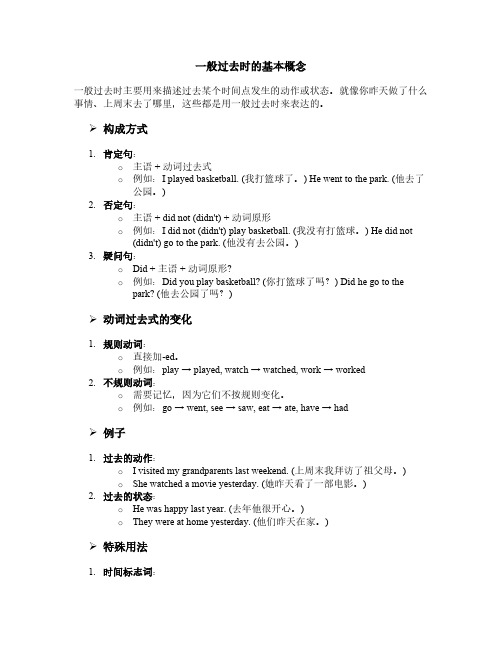
一般过去时的基本概念一般过去时主要用来描述过去某个时间点发生的动作或状态。
就像你昨天做了什么事情、上周末去了哪里,这些都是用一般过去时来表达的。
构成方式1.肯定句:o主语 + 动词过去式o例如:I played basketball. (我打篮球了。
) He went to the park. (他去了公园。
)2.否定句:o主语 + did not (didn't) + 动词原形o例如:I did not (didn't) play basketball. (我没有打篮球。
) He did not (didn't) go to the park. (他没有去公园。
)3.疑问句:o Did + 主语 + 动词原形?o例如:Did you play basketball? (你打篮球了吗?) Did he go to the park? (他去公园了吗?)动词过去式的变化1.规则动词:o直接加-ed。
o例如:play → played, watch → watched, work → worked2.不规则动词:o需要记忆,因为它们不按规则变化。
o例如:go → went, see → saw, eat → ate, have → had例子1.过去的动作:o I visited my grandparents last weekend. (上周末我拜访了祖父母。
)o She watched a movie yesterday. (她昨天看了一部电影。
)2.过去的状态:o He was happy last year. (去年他很开心。
)o They were at home yesterday. (他们昨天在家。
)特殊用法1.时间标志词:o yesterday, last night, last week/month/year, in 2020, a few days ago, whenI was youngo例如:I went to the beach last summer. (去年夏天我去了海滩。
英语的一般过去式的结构和用法
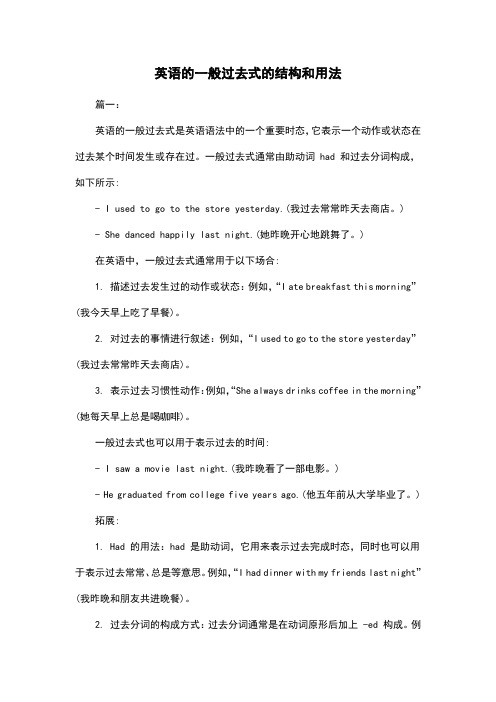
英语的一般过去式的结构和用法篇一:英语的一般过去式是英语语法中的一个重要时态,它表示一个动作或状态在过去某个时间发生或存在过。
一般过去式通常由助动词 had 和过去分词构成,如下所示:- I used to go to the store yesterday.(我过去常常昨天去商店。
)- She danced happily last night.(她昨晚开心地跳舞了。
) 在英语中,一般过去式通常用于以下场合:1. 描述过去发生过的动作或状态:例如,“I ate breakfast this morning”(我今天早上吃了早餐)。
2. 对过去的事情进行叙述:例如,“I used to go to the store yesterday”(我过去常常昨天去商店)。
3. 表示过去习惯性动作:例如,“She always drinks coffee in the morning”(她每天早上总是喝咖啡)。
一般过去式也可以用于表示过去的时间:- I saw a movie last night.(我昨晚看了一部电影。
)- He graduated from college five years ago.(他五年前从大学毕业了。
) 拓展:1. Had 的用法:had 是助动词,它用来表示过去完成时态,同时也可以用于表示过去常常、总是等意思。
例如,“I had dinner with my friends last night”(我昨晚和朋友共进晚餐)。
2. 过去分词的构成方式:过去分词通常是在动词原形后加上 -ed 构成。
例如,“run - runned”(跑 - 跑过)。
3. 其他过去时态:除了一般过去式之外,英语中还有其他过去时态,如过去完成时态和过去将来时态。
过去完成时态表示过去某个时间之前已经完成的动作,例如,“I had finished my homework before dinner”(我在晚饭前完成了我的家庭作业)。
一般过去式用法总结

1)一般过去时表示在过去某个特定时间发生,也可以表示过去习惯性、经常性的动作。
一般过去时不强调动作对现在的影响,只说明过去的事情。
句式:主语+动词过去式+宾语+其它I had a word with Julia this morning.(2) 一般过去时常与表示过去的时间状语或从句连用,如:yesterday,last week,in 1993,at that time,once,during the war,before,a few days ago,when等等。
补充内容:(句子中谓语动词是用一般过去时还是用现在完成时,取决于动作是否对现在有影响)。
Have you had your lunch? 你吃过午饭了吗?(你现在不饿吗?)Yes,I have. 是的,我已经吃过了。
(已经吃饱了,不想再吃了。
)(3)带有确定的过去时间状语时,要用过去时。
如:yesterday(昨天)、two days ago…(两天前…… )、last year…(去年…)、the other day(前几天)、once upon a time(很久以前)、just now(刚才)、(4)表示过去连续发生的动作时,要用过去时。
这种情况下,往往没有表示过去的时间状语,而通过上下文来表示。
The boy opened his eyes for a moment,looked at the captain,and then died. 那男孩把眼睛张开了一会儿,看看船长,然后就去世了。
(5)表示过去一段时间内经常或反复的动作。
常与always,never等连用。
Mrs. Peter always carried an umbrella.(6)如果强调已经终止的习惯时要用used to do(过去常常做,而现在不那样做了)He used to drink alcohol.。
一般过去式的用法

一般过去式的用法一般过去式表示过去某一时间或某一时间段内所发生的动作或状态。
在英语中,一般过去式通常要在动词后加上-ed(发音变化要看前面的音素而有所不同),或者通过不规则动词的变化形式来表达。
比如,常规动词wish在过去式中是wished,而不规则动词go在过去式中是went,两种情况都需要注意。
一般过去式在句子中一般需要配合时间状语或者上下文来使用,以表达所述事件发生的确切时间或者时间段。
比如,下面的例句中使用了一些常见的时间状语:- Yesterday, I walked to the park and saw some beautiful flowers.- Last year, I visited China and had a great time there.- When I met him, he looked so happy.- She cooked dinner and then watched TV until midnight.注意,一般过去式并不含有时间限制,它可以用来描述从过去某一个时间点开始一直延续到另一个时间点的动作或状态。
比如:- I lived in Japan for four years before moving to Australia.- She studied English for six months before taking the exam. - They worked on the project for weeks and finally finished it.总之,一般过去式是描述过去发生的事情的一种基本方式,需要牢记不规则动词的变化形式和常见的时间状语,才能在英语中流利地表达过去的动作或状态。
一般过去时结构与用法
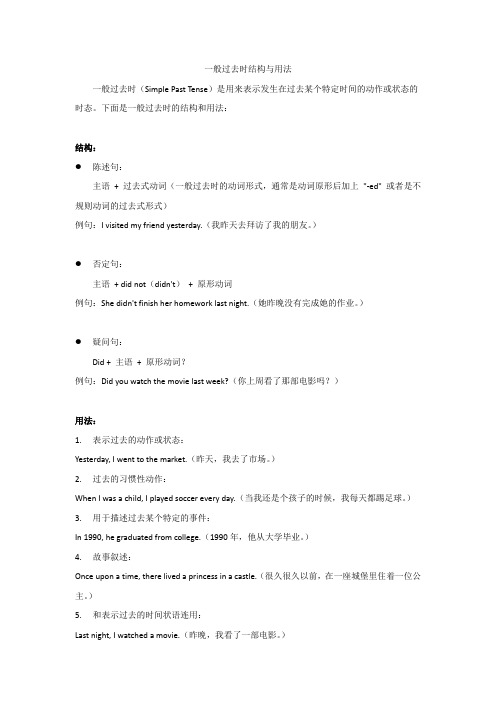
一般过去时结构与用法一般过去时(Simple Past Tense)是用来表示发生在过去某个特定时间的动作或状态的时态。
下面是一般过去时的结构和用法:结构:●陈述句:主语+ 过去式动词(一般过去时的动词形式,通常是动词原形后加上"-ed" 或者是不规则动词的过去式形式)例句:I visited my friend yesterday.(我昨天去拜访了我的朋友。
)●否定句:主语+ did not(didn't)+ 原形动词例句:She didn't finish her homework last night.(她昨晚没有完成她的作业。
)●疑问句:Did + 主语+ 原形动词?例句:Did you watch the movie last week?(你上周看了那部电影吗?)用法:1.表示过去的动作或状态:Yesterday, I went to the market.(昨天,我去了市场。
)2.过去的习惯性动作:When I was a child, I played soccer every day.(当我还是个孩子的时候,我每天都踢足球。
)3.用于描述过去某个特定的事件:In 1990, he graduated from college.(1990年,他从大学毕业。
)4.故事叙述:Once upon a time, there lived a princess in a castle.(很久很久以前,在一座城堡里住着一位公主。
)5.和表示过去的时间状语连用:Last night, I watched a movie.(昨晚,我看了一部电影。
)请注意,对于不规则动词,其过去时形式并不是简单地在动词后加上"-ed",而是有规定的形式,需要记忆。
例如,动词"go" 的过去式是"went",而不是"goed"。
一般过去时用法

一般过去时用法一般过去时是英语中最常用的过去时态之一,用于描述过去发生的动作、事件或状态。
本文将介绍一般过去时的用法、时态转换、标志词及常见注意事项。
一、一般过去时的用法一般过去时用于以下情况:1. 过去发生的具体动作或事件:- We went to the beach last summer.(我们去年夏天去了海滩。
)- He cooked dinner yesterday.(他昨天做了晚餐。
)2. 过去的习惯或经常性动作:- She always walked to school when she was young.(她小时候总是步行去学校。
)- We used to play basketball every Saturday.(我们过去每个星期六都会打篮球。
)3. 对现在具有影响的过去经历或经验:- I learned how to swim when I was a child, and now I love swimming.(我小时候学会游泳了,现在我非常喜欢游泳。
)- They lived abroad for five years and now they can speak fluent English.(他们在国外生活了五年,现在能够说一口流利的英语。
)二、时态转换1. 肯定句:一般过去时的肯定句结构为:主语 + 动词过去式(或助动词did + 动词原形)+ 其他。
- I studied Chinese for three years.(我学了三年中文。
)- She played tennis with her friends yesterday.(她昨天和朋友们打网球。
)2. 否定句:一般过去时的否定句结构为:主语 + did not (didn't) + 动词原形 +其他。
- We didn't go to the party last night.(我们昨晚没有去参加派对。
英语语法一般过去时的用法

英语语法一般过去时的用法一般过去时表示过去某个时间里发生的动作或状态;过去习惯性、经常性的动作、行为。
在英语语法中,“时“指动作发生的时间,”态“指动作的样子和状态。
下面是小编为您收集整理的英语语法一般过去时的用法,供大家参考!英语语法一般过去时的用法一般过去时1.一般过去时表示过去某个时间发生的动作或存在的状态,常和表示过去的时间状语连用。
一般过去时也表示过去经常或反复发生的动作感谢。
2.Be动词在一般过去时中的变化:⑴am和is在一般过去时中变为was(was not=wasn’t)⑵are在一般过去时中变为were(were not=weren’t)⑶带有was或were的句子,其否定、疑问的变化和is, am, are 一样,即否定句在was或were后加not,一般疑问句把was或were 调到句首。
3.句中没有be动词的一般过去时的句子否定句:di dn’t +动词原形,如:Jim didn’t go home yesterday.一般疑问句:在句首加did,句子中的动词过去式变回原形。
如:Did Jim go home yesterday?特殊疑问句:⑴疑问词+did+主语+动词原形?如:What did Jim do yesterday?⑵疑问词当主语时:疑问词+动词过去式?如:Who went to home yesterday?动词过去式变化规则:1.一般在动词末尾加-ed,如:pull-pulled, cook-cooked2.结尾是e加d,如:taste-tasted3.末尾只有一个元音字母和一个辅音字母的重读闭音节,应双写末尾的辅音字母,再加-ed,如:stop-stopped4.以“辅音字母+y”结尾的,变y为i,再加-ed,如:study-studied5.不规则动词过去式:am,is-was, are-were, do-did, see-saw, say-said, give-gave, get-got, go-went, come-came, have-had, eat-ate, take-took, run-ran, sing-sang, put-put, make-made, read-read, write-wrote, draw-drew, drink-drank, fly-flew, ride-rode, speak-spoke, sweep-swept, swim-swam, sit-sat 过去时练习写出下列动词的过去式is\am_______ fly_______ plant_______ are_______drink_______ play_______ go_______ make_______does_______ dance_______ worry________ ask_______taste_______ eat_______ draw________ put_______throw_______ kick_______ pass_______ do_______语法讲解一般过去时也叫单纯过去时。
一般过去时四种用法

一般过去时四种用法①表示在过去某个时间发生的动作或情况。
例如:I went to school at 7:00 yesterday morning.我昨天早晨七点去上学。
②表示在过去某个时间存在的状态。
例如:She was not at home last night.她昨晚八点没在家。
③表示在过去经常或反复发生的动作,常和often(经常)、always(总是)、sometimes(有时)等表示频率的时间状语连用。
例如:He often had lunch at school last month.他上个月经常在学校吃午饭。
④表示已故的人所做的事情或情况。
例如:Ba Jin wrote a lot of novels for us.巴金写了很多部小说。
四种时间状语①yesterday 及相关短语。
例yesterdaymorning/afternoon/ev ening 昨天上午/下午/晚上。
② “last+ 时间状语”构成的短语。
例如:lastnight/month/spring/year 昨晚/上个月/去年春天/去年。
③“一段时间+ago”组成的短语。
例如:three days ago 三天以前 four years ago四年以前。
④ “介词+ 时间名词”组成的短语。
例如:in 1999 在1999年;on the morning of December 25th 在12月25号早上。
四种谓语动词的表现形式①be动词的过去式was、were.例如:She was a teacher five years ago. 她五年前是一名教师。
②行为动词的过去式,分为规则动词和不规则动词两种。
规则动词的过去式的构成遵循以下四个规则:1)直接在动词后加ed,例如:help-helped; want-wanted等;2)以不发音的字母e结尾时,去掉e加ed (即直接加d) , 例如:like-liked; use-used等;3)以辅音字母y结尾时,把y变成i再加ed, 例如:carry-carried; study-studied等;4)以重读闭音节结尾,双写最后一个辅音字母再加ed, 例如:stop-stopped; shop-shopped等。
简单过去时用法

简单过去时用法
一般过去时(Simple Past Tense)是英语中用来表示已经发生的动作或状态的一种时态。
它的用法如下:
1.表示过去的动作或事件:一般过去时用于描述在过去某个特定时间发生的动作或事件。
例句:She finished her homework last night.(她昨晚完成了她的作业。
)
2.表示过去的习惯性动作:一般过去时还可用于描述过去常常、经常发生的动作或习惯性状态。
例句:When I was a child, I played with my toys every day.(当我还是个孩子的时候,我每天都玩我的玩具。
)
3.表示过去的状态:一般过去时也可以用于描述过去的状态或情况。
例句:She was very tired after the long journey.(她经过漫长的旅程后很疲惫。
)
过去式的构成:一般过去时的动词构成主要是动词原形后加上了-ed,或者根据动词的不规则变化来构成过去式。
例句:I worked hard yesterday.(我昨天工作很努力。
)
需要注意的是,一般过去时通常与特定的时间状语连用,以明确动作发生的时间,如yesterday(昨天)、last week(上周)、in 2005(在2005年)等。
同时,一般过去时还可与表示过去的时间段连用,如for two years(两年)、since last summer(自上个夏天以来)等。
一般过去时的用法及结构
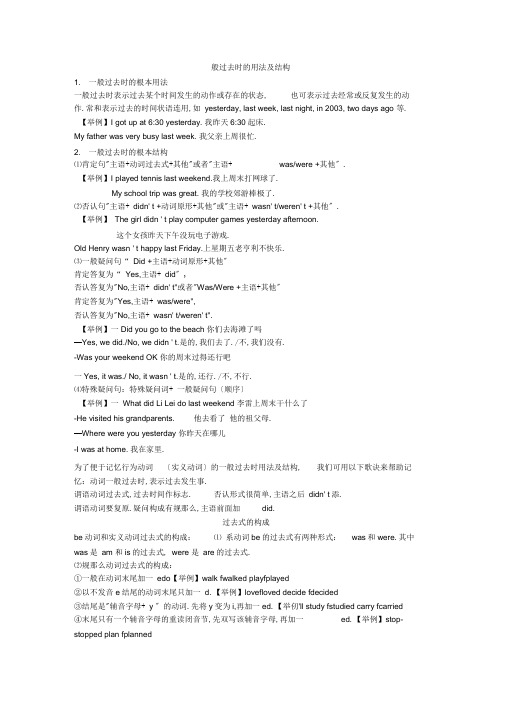
般过去时的用法及结构1. 一般过去时的根本用法一般过去时表示过去某个时间发生的动作或存在的状态, 也可表示过去经常或反复发生的动作.常和表示过去的时间状语连用,如yesterday, last week, last night, in 2003, two days ago 等.【举例】I got up at 6:30 yesterday. 我昨天6:30起床.My father was very busy last week. 我父亲上周很忙.2. 一般过去时的根本结构⑴肯定句"主语+动词过去式+其他"或者"主语+ was/were +其他〞.【举例】I played tennis last weekend.我上周末打网球了.My school trip was great. 我的学校郊游棒极了.⑵否认句"主语+ didn' t +动词原形+其他"或"主语+ wasn' t/weren' t +其他〞.【举例】The girl didn ' t play computer games yesterday afternoon.这个女孩昨天下午没玩电子游戏.Old Henry wasn ' t happy last Friday.上星期五老亨利不快乐.⑶一般疑问句“ Did +主语+动词原形+其他〞肯定答复为“ Yes,主语+ did〞,否认答复为"No,主语+ didn' t"或者"Was/Were +主语+其他〞肯定答复为"Yes,主语+ was/were",否认答复为"No,主语+ wasn' t/weren' t".【举例】一Did you go to the beach 你们去海滩了吗—Yes, we did./No, we didn ' t.是的,我们去了./不,我们没有.-Was your weekend OK 你的周末过得还行吧一Yes, it was./ No, it wasn ' t.是的,还行./不,不行.⑷特殊疑问句:特殊疑问词+ 一般疑问句〔顺序〕【举例】一What did Li Lei do last weekend 李雷上周末干什么了-He visited his grandparents. 他去看了他的祖父母.—Where were you yesterday 你昨天在哪儿-I was at home. 我在家里.为了便于记忆行为动词〔实义动词〕的一般过去时用法及结构, 我们可用以下歌诀来帮助记忆:动词一般过去时,表示过去发生事.谓语动词过去式,过去时间作标志. 否认形式很简单,主语之后didn' t添.谓语动词要复原.疑问构成有规那么,主语前面加did.过去式的构成be动词和实义动词过去式的构成:⑴ 系动词be的过去式有两种形式:was和were.其中was是am 和is的过去式, were 是are的过去式.⑵规那么动词过去式的构成:①一般在动词末尾加一edo【举例】walk fwalked playfplayed②以不发音e结尾的动词末尾只加一d.【举例】lovefloved decide fdecided③结尾是"辅音字母+ y 〞的动词.先将y变为i,再加一ed.【举仞'll study fstudied carry fcarried④末尾只有一个辅音字母的重读闭音节,先双写该辅音字母,再加一ed.【举例】stop-stopped plan fplanned规那么动词的过去式构成方法可用以下口诀来记忆:过去式构成有规律,一般词尾加一ed如果词尾有个e 〔不发音的〕,只需直接加上一d. “辅音字母+ y 〞在词尾,变y为i加一ed.“一辅重闭〞作尾巴,双写之后加一ed.随堂练习:一.写出以下动词的过去式./is _________ ___________ _____________ ____________'t 6. aren' t二.用适当的词完成以下对话.1.— How was your weekend — It great.一What _ you_ last weekend — I _ some homework.to the beach.2. 一What last weekend She3. —What —___ they do last weekend —They ___ ___ to the movies.三.用括号内所给词的适当形式填空.1. We(enjoy) ourselves at the party last night.(study) for the English test last Sunday.you(go) to the Great Wall last year4. What day(be) it yesterdayold man(be)ill and went to see a doctor.(have) a party last night.(visit) the museum and went home.8.— How(be) the students — They were very friendly.often(have) supper at home. Today he(have) supper at school.had great fun(play) in the water.made me(feel) very happy.12.-he(have) lunch at nine — No, he didn ' t.(buy) a guitar yesterday.四.句型转换.1. He came here last month.(改为否认句)He here last month.1.1. hey played football this morning.(改为一般疑问句并作简略答复)一they football this morning —Yes, they./ No, they.3 .They went to Beijing last year.(就划线局部提问)they last year.4 .Tom watched TV last night.(改为一般疑问句)Tom TV last night5 .Mary does homework every day.(用last night 改写句子)Mary.般现在时的用法与结构1、一般现在时的定义及构成一般现在时表示现在经常反复发生的动作、存在的状态或习惯性的动作.〔1〕 be〔am,is,are〕动词:〔作谓语动词时〕肯定句:主语+be动词〔am,is,are〕+其它.如:①I am a student.〔主语+be动词+名词〕②They are hungry.〔主语+be动词+形容词〕③He is out.〔主语+be动词+副词〕④That pen is mine.〔主语+be动词+ 代词〕⑤I am fifteen.〔主语+be动词+数词〕⑥The bike is under the tree.〔主语+be动词+H司短语〕运用am,is,are写三个句子否认句:主语+ be〔am,is,are〕 + not +其它.如:He is not a worker.他不是工人. 运用am,is,are 写三个句子一般疑问句:Be〔am,is,are〕 +主语+其它.如:-Are you a student -Yes. I am. / No, I'm not.运用am,is,are 写三个句子特殊疑问句:疑问词+一般疑问句.如:Where is my bike 运用am,is,are 写三个句子特殊疑问句:疑问词〔what, where, who, when, which, whose, how, how many, how much, what shape,what colour,〕,找句子中有没有be动词〔is, am或者are〕或情态动词或者助动词〔特殊疑问句:疑问词+be动词〔is, am或者are〕或情态动词或者助动词+其他〕〔2〕行为动词:主语+ 行为动词+ 〔其它〕.〔作谓语动词时〕1〕主语不是第三人称单数时,肯定句为:主语+动词原形+其它否认式为:主语+don't+动词原形+其它疑问句为:Do+主语+动词原形+其它. ① We speak Chinese.②Do you speak Chinese ---Yes, I do. / No, I don't.③They don't speak Chinese.写三个句子2〕当主语是第三人称单数时:〔he,she,it,A/An,单独的人或事物:Lily/book〕肯定句为:主语+动词〔词尾加s或es〕 +其它.否认式为:主语+doesn't+动词原形+其它.疑问句式:Does+主语+动词原形+其它①He speaks English.②He doesn't speaks English.③-Does she go to work by bike Yes, she does. / No, she doesn't.写三个句子特殊疑问句:疑问词+一般疑问句.如:How does your father go to work3〕动词+s的变化规那么〔1〕一般情况下,直接加-s,如:cook-cooks, milk-milks〔2〕以s. x. sh. ch. o 结尾,力口-es, 如: guess-guesses, wash-washes, watch-watches, go-goes 〔3〕以"辅音字母+y"结尾,变y为i,再加-es,如:study-studies〔3〕情态动词〔作谓语动词时〕〔can,could,be able to,may,might,must,have to,need,shall,should, will,would〕时,句子结构为:肯定句:主语+情态动词+动词原形.否认句:主语+情态动词+not+动词原形一般疑问句;情态动词+主语+动词原形+其他特殊疑问句:疑问词+情态动词+主语+动词原形+其他Eg:① He can speak English.② Can I help you What can I do for you在实际应用中,一般现在时常与以下时间状语联用:always, usually, often, sometimes, every week (day, year, month …), once a week, on Sundays 例句:He usually plays football on Sundays.一、写出以下动词的第三人称单数talk forget hope stop perform play saybuy worry fly study like make take__love recite become come drive二、句型转换1. The children have a good time in the park.否认句:_______________________________________________一般疑问句:_____________________________________________对划线局部提问:_________________________________________2. There is about nine hundred people at the concert.否认句:_______________________________________________一般疑问句:_____________________________________________对划线局部提问:_________________________________________3. Ann does her homework yesterday evening.否认句:_______________________________________________一般疑问句:_____________________________________________对划线局部提问:_________________________________________4. I read an English book.否认句:______________________________________________一般疑问句:_____________________________________________肯定/否认答复:________________________________________对划线局部提问:_________________________________________5. My brother is in the park just now.否认句:______________________________________________一般疑问句:_____________________________________________对划线局部提问:_________________________________________一般现在时第三人称单数句型转换练习1. I go to school before 7:00 in the morning.(he ) __________________________________________________________2. I always go shopping with my mum on Sunday.( she ) ________________________________________________________2.1 sometimes play computer games after school on Sunday.( he ) _________________________________________________________4. I always take exercise after class on Monday.( my mother ) ________________________________________________________般过去时详细讲解与练习题一、巧记一般过去时:动词一般过去时,表示过去发生的事;be用was或用were, have,has变had;谓语动词过去式,过去时间作标志;一般动词加-ed,假设是特殊得硬记.否认句很简单,主语之后didn' t添;疑问句也不难,did放在主语前;}不含be动词时如果谓语之前有did,谓语动词需复原;动词假设是was,were,否认就把not添. }含be动词时疑问句也不难,要把was, were放在主语前.二、be的一般过去时:学习动词be的一般过去时,下面有一口诀,它可以帮你们更好地掌握动词be的一般过去时.be的过去时有四巧:一是时间状语巧,表示过去的短语要记牢;二是形式巧,单数was,复数were ;三巧是否认句结构, not紧跟was/were ;四是疑问句式巧,was/were向前跑(提前).【一巧】时间状语(即标志词)巧.一般过去时表示过去发生的动作或存在的状态,恰巧与表示过去的一些时间状语连用.1 . yesterday 或以其构成的短语:yesterday morning(afternoon, evening) 等;2 .由“last+-时间名词〞构成的短语:last night, last year (winter, month, week)等;3 .由“时间段+ago〞构成的短语: a moment ago, a short time ago, an hour ago 等;4 .其它:just now 等5 .由某些表示过去时态的从句等.【二巧】形式巧.它与一般现在时一样,形式多样:当主语是第一人称单数或第三人称单数时,谓语动词用was;主语是第二人称或其他人称复数时,谓语动词用were.例如:I was in the classroom yesterday morning . 昨天早上我在教室里.He was at school last Tuesday. 上周二他在学校.They were over there a moment ago . 刚刚他们在刃B边.【三巧】否认句结构巧.与动词be的一般现在时一样, 它在动词后面加not即可变成否认句,并且was, were与not可以缩写成wasn't, weren't o即:主语 + wasn't/ weren't + 表语 +其他.例如:I was not (= wasn't) here yesterday . 昨天我不在这儿.My parents were not ( = weren't) at home last Sunday . 上周日我父母不在家.【四巧】疑问句式巧.把was, were 提到句首,句末用问号即可变为一般疑问句. 即: Was(Were) +主语+表语+其他这恰巧与动词be 的一般现在时的疑问句式相似.例如: Were you at home the day before yesterday ? 前天你在家吗Was she late this morning?今天早上她迟到了吗更巧的是疑问句的答语也相似,肯定答复用“ Yes,主语+ was/were . 否认答复用“No,主语+ wasn't/weren't .".例如:一Were Wei Hua and Han Mei here just now ?刚刚魏华和韩梅在这儿吗— Yes, they were. (No, they weren't .)是的,她们在.(不,她们不在.)一、单项选择: 从以下各题后所给的四个选项中选择最正确答案填空. (10)( )1. My father ill yesterday . A isn't B. aren't C. wasn't D. weren't ()2. your parents at home last week ?A IsB WasC AreD Were()3. The twins in Dalian last year.They here now .A are; wereB . were; areC was; areD were; was ()4. your father at work the day yesterday (前天)? A. Was; before B. Is; beforeC. Was; afterD. Is; after()5. —Who was on duty last Friday ?A I amB I wasC Yes, I wasD No, I wasn't ()6. I cleaned my classroom.A with three hoursB three hours agoC in three hoursD three hours before ( )7. I came my house two days ago .A back onB back toC to backD back () 8 . He did some reading at home.A What does your father do yesterday eveningB What does your brother do in the schoolC What did your brother do over the weekendD Where did your brother go last Sunday ()9. What did you do I went to the movies.A next morning Bover the weekend C in the weekend D next Monday ()10. The koala sleeps, but gets up. A during the day; at the eveningB at day during nightC in the day during the eveningD during the day ; at night二、请用正确动词形式填空.(10)1. I ______2.__ (have) an exciting party last weekend. _ she _______ (practice) her guitar yesterday No, she ___________ 3. What____ T om _______ (do) on Saturday eveningHe ______ _(watch) TV and _________ (read) an interesting book. 4. They all________ (go) to the mountains yesterday morning.5.She ____ ____ (not visit) her aunt last weekend.She _____ ___ (stay) at home and _______ (do) some cleaning.6. When __ ____ you ________ (write) this song I _________ (write) it last year.7 .My friend, Carol,〔study〕 for the math test and〔practice〕 English last night.8 .Mr. Li〔do〕 the project on Monday morning Yes, he.9 . How〔be〕 Jim's weekend It〔be not〕 bad.10 .〔be〕 your mother a sales assistant last year No. she.三、译以下句子〔20〕1 .我过了一个忙碌但却刺激的周末.I ______________________________________ exciting weekend.2 . Jenny喜欢看书.昨晚她看了一本英语书.Jenny likes. She an English book last night.3 . Emma每天都看电视.可是昨天他没有看.Emma TV every day. But he yesterday.4 .上周六他们做什么了他们做作业和购物了.What they SaturdayThey homework and.5 .今天早上方方得做饭,由于他父亲不在家.This morning Fangfang ________________ because his father yesterday.6 .你还有什么要说的What would you like7 .放学另U忘了向老说声再见. Don, t forget ____________________________ the teacher.8 .为什么你昨晚没有看电视Why you TV last night9 .他在清扫教室的时候,发现地上有块表.When he the classroom, he a watch on the ground.10 .他什么时候出生的1980年.--When he---1980.四、改写句子:〔20〕1、Lucy did her homework at home.〔改否认句〕Lucy her homework at home.2、He found some meat in the fridge 〔冰箱〕.〔变一般疑问句〕 he meat in the fridge3、There was some orange in the cup.〔变一般疑问句〕 there orange in the cup4. Frank read an interesting book about history. 〔一般疑问句〕Frank an interesting book about history5. Why not go out for a walk 〔同义句〕out for a walk6. Thomas spent RMB 10 on this book.〔否认句〕Thomas RMB 10 on this book.7. My family went to the beach last week.〔划线提问〕family last week8. I think she is Lily' s sister.〔否认句.注意否认转移〕9. Sally often does some reading in the morning. 〔否认句〕Sally often some reading in the morning.10. He is a tall, thin boy.〔划线提问〕_ he五、改错题(20)1. How is Jane yesterday2. He go to school by bus last week.3. He often goes home at 6:00 last month.4. I can fly kites seven years ago. _____________________________5. Did you saw him just now. ___________________________________6. Tom wasn' t watch TV last night. _____________________________________7. I didn ' t my homework yesterday. ____________________________________8. He wait for you three hours ago. ___________________________________9. Who find it just now ________________________________________make him cry (哭)just now __________________________________六、完形填空(10)Tom did not like doing his homework , because he liked to do some 1 things after school . And his teacher always 2 a lotof mistakes in his homework .Then one day, his maths teacher 3 at Tom' s homework and saw that he got all hisanswers right . He was very 4 and surprised (惊奇).The next morning before class ,he called Tom 5 his desk and 6 to him , “You got all your homework right thistime . Did your father help you " Sometimes Tom' s father helped him with his homework , 7 this time he didn ' t help Tom because he 8 at home . So Tom answered, " NO,Sir. He Was busy last night, so I 9 to do it 1010. . A. others B. another C . the other D. other11. . A. made B. found C. looked at D. looked12. . A. laughed B. knocked C. looked D. saw13. . A. please B. pleased C. pleasure D. sad14. . A. to B. forC. inD. at15. . A. talked B. asked C. spoke D. said16. . A. and B. but C. so D. or17. . A. isn' t B. won' tbeC. wasn' t D. can' t be18. . A. wanted B . mustn ' t C. liked D. had19. 0. A. itself B . of them C . myself D. himself七.写作(10).日记一那么,字数50---60.记叙一天的活动:1 .早晨起床,吃饭,上学;2 .上午的课程,并就其中一堂课进行描述; 3.午休的活动;4.下午的课程及作业;5.晚上的安排.答案:一、单项选择:1---5 CDBAB 6----10 BBCBD二、 2. Did; practice; didn't ; do; watched; read5.didn't visit; stayed; did write; wrote ; practiced8. Did; do;did ; wasn't 10. Was; wasn't三、 a busy but books; read; didn't watch TV ; do last; did their; went shoppingto cook breakfast; wasn't at home ; to say; say goodbye to ; watch ; found ; born; In四、't do 2. Did; find any 3. Was; any4. Did; read5. Why don't you go 't spend did your; go 8. I don't think she is Lily's sister 't; do. 10. What does; look like五、't didn't7.在didn't 后力口do六、1----5 DBCBA 6——10 DBCDC七、写作〔略〕。
- 1、下载文档前请自行甄别文档内容的完整性,平台不提供额外的编辑、内容补充、找答案等附加服务。
- 2、"仅部分预览"的文档,不可在线预览部分如存在完整性等问题,可反馈申请退款(可完整预览的文档不适用该条件!)。
- 3、如文档侵犯您的权益,请联系客服反馈,我们会尽快为您处理(人工客服工作时间:9:00-18:30)。
一般过去式的用法:一般过去式表示过去的动作和状态,通常一般过去式带有表示动作时间状语的词,词组或从句,如yesterday, the day before last, last week, two days ago 等,上下文清楚时可以不带时间状语。
I worked in that factory last year. 去年我在那一家工厂工作。
I met him yesterday. 昨天我碰见了他。
I went to the Tian Long Mountain yesterday.昨天我们去了天龙山。
一般过去式构成:表示一般过去式的动词通常用动词的过去式形式来表示,而动词的过去式是在动词原形的基础上变化的。
动词的过去式可分为规则动词和不规则动词。
a.规则动词的过去式变化如下:①一般情况下在动词原形后直接加-ed。
如:wanted,played, worked played ,acted, looked called opened needed。
②以不发音的字母e结尾的动词,去掉e再加-ed。
如:hoped,lived。
③以一个辅音字母结尾的重读闭音节动词,双写词尾辅音字母,再加-ed,如:stopped planned fitted④以辅音字母+y结尾的动词变y为i,再加-ed。
如:studied,worried, tried ,copied ,cried, carried。
以原音字母加y结尾的词,直接加-ed play enjoy stay played enjoyed stayed 规则动词过去式的读音也有规律可循。
请记住:清后[t],元浊[d],[t] [d]之后读[id]。
①清辅音[p] [k] [f] [s]等后,ed要读[t]。
如:worked,finished。
②元音或浊辅音[b] [g] [v] [z] [m]等后,ed要读[d]。
如:lived,called。
③[t]或[d]后,ed读[id]。
如:started,needed。
b.不规则动词变化不规则动词的过去式变化规律性不强,须多加记忆。
1.动词原形和过去式完全同形。
例:hurt(伤害)put(放)let(让)2.动词原形、过去式形式完全不同。
例:give(给)gave fly(飞)flew drink(喝)drank see(看见)saw go (去)went make - made get - got buy - bought come came know(知道)knew wear (穿)wore speak(说)spokebe动词过去式有两种形式,主语是第一、三人称单数形式使用was,其他人称用were6 现在分词的变化规则一般在动词原形词尾加-ing,go push play carry going pushing playing carrying以不发音的e结尾的动词,先去掉e,再加-ing take write leave taking writing leaving重读闭音节结尾的动词,如果词尾只有一个辅音字母,要将该辅音字母双写,再加-ing cut stop fit begin forget cutting stopping fitting beginning forgetting 以ie结尾的动词,要把ie改为y,再加-ing牛津英语6A英语语法(二) 一般过去时定义:表示过去某时发生的动作或存在的状态。
结构:“主语+动词的过去式”用法:1.表示过去某个时间发生的动作或存在的状态。
He was here yesterday.I got up at seven yesterday morning.My mother was at work yesterday afternoon.Did you have a good time last summer2.表示过去经常或反复发生的动作。
My mother often went to work by taxi last year.When I was a student, I often listened to music.3. 常与一般过去时态连用的时间有:at that time, then, at that moment, yesterday, yesterday morning (afternoon, evening…)last night (week, month, year…),一段时间+ago(several days ago), two days ago, a week ago, three years ago…in 1990, (in 1997…) ,just now, long before, long, long ago二. 动词过去式构成规则(一)1、一般在动词原形末尾加–edhelp →helped, look →looked, play →played, work →worked, listen →listened, wash →washed, clean →cleaned,2、结尾是e 的动词加-- dlive---lived hope---hoped use---used like --- liked3、末尾只有一个辅音字母的重读闭音节词,先双写这个辅音字母,再加—edstop---stopped plan---planned4、结尾是“辅音字母+y”的动词,先变“y”为“i”再加—edstudy---studied carry ---carried cry --- cried worry →worried(二) 动词过去式的读音规则规则动词加-ed的读音:基本规则是轻轻,浊浊,既在轻辅音后加ed读轻辅音/t/。
在浊辅音及元音后加ed读浊辅音/d/ 。
例:ask →asked /a:skt/, cook →cooked /kukt/, pass →passed /pa:st/,例:move →moved /mu:vd/, live →lived / livd/, listen →listened/`lisnd/, stay →stayed /steid/在/t/ /d/ 之后念/id/ , 即ed 在/t/ /d/ 音后面念/id/例:shout →shouted 去式与动词原形的拼写形式相同:let →let, put →put, read →read,(注意read的过去式读[red])b. i →a: begin →began, drink →drank, give →gave, ring →rang, sing →sang, sit →sat, swim →swamc. i →o: drive →drove, ride →rode, write →wroted. ow →ew: grow →grew, know →knew, throw →threwe. 含ough或augh的:bring →brought, buy →bought, think →thought;catch →caught, teach →taughtf. am is ---was are ---were do---did can---could come---came不规则动词的过去式平时出现要留心,逐个熟记,注意积累。
三. 句型转化:1.be 动词的过去时的句型如下:(1)否定句:主语+ be动词的过去式(was, were)+ not…(2)疑问句:be动词的过去式(was, were)+ 主语…was busy yesterday. (肯定句) 他昨天很忙。
was not busy yesterday. (否定句) 他昨天不忙。
he busy yesterday (疑问句) 他昨天忙吗weren’t any boys in the room.房间里没有男孩儿。
e. Were there any boys in the room 房间里有男孩儿吗2.行为动词的否定式和疑问式:(1)若肯定句中只有一个行为动词,那就得在行为动词前加上did not或缩略式didn’t,并把这个行为动词由过去式改为动词原形。
例如:a. I called Lin Tao yesterday afternoon. →I did not / didn’t call Lin Tao yesterday afternoon.b. I borrowed a book from Sun Yang last Sunday. →I didn’t borrow a book from Sun Yang last Sunday.(2) 行为动词的一般疑问句若在陈述句中只有行为动词的过去式,那就得在句首加上一个助动词did来帮助提问,然后把句中的行为动词由过去式改为动词原形,并在句末打上问号。
回答时别忘了还用did.例如:a. We stayed there for 10 days last month. →Did you stay there for 10 days last month Yes, we did. / No, we didn’t.b. Mary had a delicious dinner yesterday evening. →Did Mary have a delicious dinner yesterday evening Yes, she did. / No, she didn’t练习:一.用所给动词的适当形式填空。
1. We ______ (live) in Japan last year.2. Susan_______ (stop) the car on the street yesterday.3. My mother_______ (clean) my room and ______(study) for the English test last Sunday.4. What ______ you ______(do) last night5. On Saturday morning I _____(play) football.二.用括号内所给动词的适当形式填空。
(1) May__________ (finish) her homework very late yesterday evening.(2) Han Mei __________ (bring) her pet to the park that day.(3) His father __________ (buy) a new computer for him last week.(4) Miss Du__________ (walk) to work every day last term.(5) We __________ (move) to Shenyang 8 years ago.(6) __________ you __________ (have) bread for breakfast this morning(7) She __________ (give) me a nice present last night.(8) The police __________ (stop) the car and __________ (catch) the thief (小偷) just now.(9) Tom __________ (carry) water for the old man last Saturday.(10)Uncle Wang _____________ ( come )into the room and __________ ( find ) something to eat.(11).Lily ______________ ( study ) in the classroom for two hours and then_________ ( leave ).(12).Jimmy __________ ( do ) a lot today. He _________ ( go ) shopping and ________ ( cook ) supper.(13).We _________ ( go ) to the cinema last night. The film ___________ ( be ) very good.(14).What time _________ you __________ ( get ) to school this morning三.按要求变换下列句型,每空一词。
